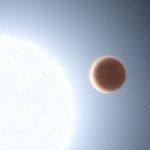Scientists find the ancestor of a supermassive black hole
Scientists identified a distant object with properties that lie between those of a galaxy and those of a so-called quasar.
The object was born relatively...
Pluto’s orbit is surprisingly unstable, shows study
In 1930, astronomer Clyde Tombaugh discovered the fabled "Ninth Planet" (or "Planet X") while working at the Lowell Observatory in Flagstaff, Arizona.
The existence of...
Scientists find a new kind of stellar explosion called micronova
Astronomers, with the help of the European Southern Observatory’s Very Large Telescope (ESO’s VLT), have observed a new type of stellar explosion — a...
An ancestor of supermassive black holes, found at cosmic dawn
At the center of the more-massive galaxies in the Universe lie the intensely powerful and energetic phenomena known as supermassive black holes (SMBHs).
This includes...
Astronomers find rare slimmer red giant stars for the first time
A new, slimmer type of red giant star has been identified by astronomers, who liken their discovery to 'finding Wally'. Only around 40 of...
Astronomers detect extreme weather on ultra-hot Jupiters
In studying a unique class of ultra-hot exoplanets, NASA Hubble Space Telescope astronomers may be in the mood for dancing to the Calypso party...
NASA’s Hubble finds a planet forming in an unconventional way
NASA's Hubble Space Telescope has directly photographed evidence of a Jupiter-like protoplanet forming through what researchers describe as an "intense and violent process."
This discovery...
How would a nuclear winter impact food production
The day after lead author Daniel Winstead approved the final proofs for a study to be published in Ambio, Russia put its nuclear forces...
Scientists discover new source of super-fast electron rain raining down on Earth
UCLA scientists have discovered a new source of super-fast, energetic electrons raining down on Earth, a phenomenon that contributes to the colorful aurora borealis...
Scientists find mysterious wave in the sun with unexplained speed
Researchers from NYU Abu Dhabi's (NYUAD) Center for Space Science have discovered a new set of waves in the sun that, unexpectedly, appear to...










